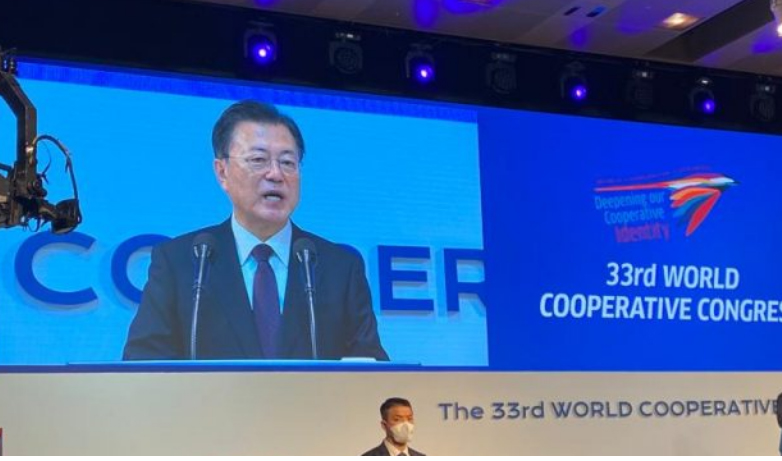By Anca Voinea
The president of South Korea, Moon Jae-in, was a keynote speaker at the World Cooperative Congress in Seoul, where he emphasised the importance of the social economy, including co-operatives.
Mr Jae-in gave his speech in person at the opening day of the International Cooperative Alliance to a combined physical and online audience of more than 1,000 co-operators.
He highlighted the scale of the co-operative sector in his country and around the world and had warm words for the movement’s work on solidarity, sustainable development and empowerment.
It is important that co-operatives collaborate with the wider social economy as well as with other co-operatives, he said, and pointed to support mechanisms available to the movement, such as funding and training.
Since the Korean government adopted a social economy policy in 2017, the number of social enterprises in the country has grown from 20,000 to 30,000, operating in sectors ranging from finance and retail to renewable energy, social care, services and research. South Korea is home to 5,100 co-operatives with over 313,00 members and more than 22,000 employees.
Congress also heard from the minister of economy, Hong Nam-ki, who said the social economy is a growing sector in Korea, employing over 300,000 people. The government will continue to support the sector, he added, and promote participative business models.
Co-operatives operate within the national Framework Act on Cooperatives, adopted in 2012 to strengthen the social and solidarity economy. Following the adoption of the act, a First Master Plan for Cooperatives was introduced to build a favourable environment. Further co-op policies were adopted in 2015, including research to identify the difficulties facing the sector; redirecting policies to support the sustainable development of co-operatives; exploring successful co-operative models; and intensively fostering strategic sectors.
The Second Master Plan for Cooperatives was introduced in 2017 to strengthen the autonomy of co-operatives, improve awareness on co-operatives, enable the creation of jobs through co-operatives, and strengthen the overall co-operative market.





